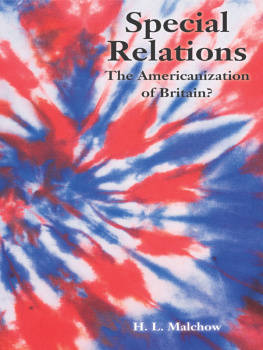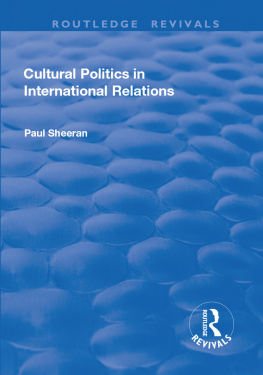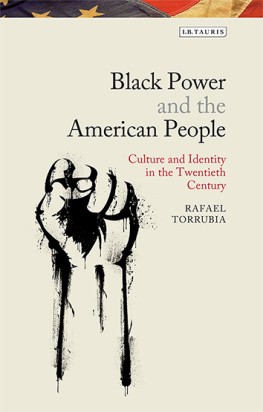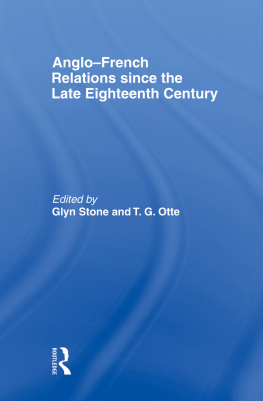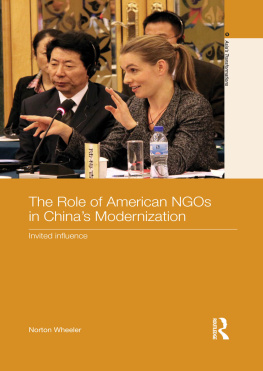This book has been published with the assistance of Tufts University.
Stanford University Press
Stanford, California
2011 by the Board of Trustees of the Leland Stanford Junior University
All rights reserved.
No part of this printing may be reproduced or transmitted in any form or by any means, electronic or mechanical, including photocopying and recording, or in any information storage or retrieval system without the prior written permission of Stanford University Press.
Printed in the United States of America on acid-free, archival-quality paper
Library of Congress Cataloging-in-Publication Data
Malchow, Howard L.
Special relations: the Americanization of Britain?/H. L. Malchow
pages cm.
Includes bibliographical references and index.
ISBN 978-0-8047-7399-7 (cloth: alk. paper)
1. Great BritainCivilizationAmerican influences. 2. Great Britain
Civilization1945. 3. Popular cultureHistory20th century. 4. Social
movementsHistory20th century. 5. Great BritainRelationsUnited
States. 6. United StatesRelationsGreat Britain. I. Title.
DA566.4.M34 2011
303.48241073dc22
2010043066
Typeset at Stanford University Press in 10/12.5 Minion
E-book ISBN: 978-0-8047-7783-4
Acknowledgments
In the decade and more it has taken this work to evolve I have incurred a debt to manyto my colleagues and especially to my students at Tufts University, to those patient librarians who have assisted me in Britain and the United States, and to many friends who have talked of their experiences and listened to mine. I am particularly obliged to friends no longer livingGerald R. Gill, Ann Lafferty, and Jaki Leversonand to Benjamin Botnick, Virginia Drachman, Melanie Hall, Andrew Laing, Chad Andrew Martin, David Newell, Stan Rogerson, Michael Saler, Ann Imlah Schneider, Anna Thew and Martin Lugg, and John Thomas. Stephen Brooke and an anonymous reviewer solicited by Stanford University Press gave me valuable advice about improving the manuscript. I have long owed a debt of gratitude to Norris Pope at Stanford Press, and, as ever, to Peter Stansky for his patient encouragement and sage advice. Whatever flaws and weaknesses there may be here are mine and not theirs.
Preface: Trafalgar Square, 19/20 July 1969

Toward evening on Saturday, the 19th of July 1969, Trafalgar Square filled with a mostly youthful crowd. Only nine months earlier the square, historic site of both protest and celebration, had been packed with an agitated throng opposed to the Vietnam War and its technology of death, many of whom marched off to what proved to be the last of the great demonstrations at the American embassy in Grosvenor Square. This expectant, if anxious, crowd, however, had assembled to cheer the success of American technology, and to celebrate, as it were, the humanism of its modernity. A giant television screen had been erected before the National Gallery on the squares north side where, a little past 9:00 p.m. London time, live satellite images from NASAs space center in Houston would play out the drama of Apollo XIs Moon landing. For the millions of others who would watch crowded around the family tellya larger audience than that for the Queens coronation in 1953 and probably rivaling the 25 million or so who watched Churchills funeral in 1965the event was, as for hundreds of millions around the world, high drama unfolding in their sitting rooms, and when it was over the national grid reported a critical surge of demand as, it was said, millions of electric tea kettles were simultaneously set to boil. Each of the three television channels in Britain scheduled intensive coverage for Saturday night and Sunday morning, and substantial coverage during the following three days before the Apollo crew returned to Earth.
By most accounts,
The era of satellite-relayed telecommunications that made the Moon landing an event of worldwide simultaneity had begun seven years earlier, on 11 July 1962, when the American AT&T Telstar satellite beamed its first live pictures to the British receiving station at Goonhilly in Cornwall. As one observer there at the receiving dish later recalled, You felt as if you were really at the centre of something. Among some others, however, the historic moment evoked reflections of a rather different kind. The Conservative MP for Morecambe and Lonsdale, Basil de Ferranti, was simply annoyed that the Americans had done it all. What a pity that we could not have been the pioneers as we always used to be.
The Hughes Aircraft Companys Syncom2, the first communications satellite in geosynchronous orbit (allowing round-the-clock contact), followed in July the next year. In 1965 Hughess Early Bird satellite offered free television exchange for a few months, but then the international consortium imposed high charges that deterred commercial use until Atlantic-stationary Intelsat IIIs greatly increased capacity and lowered cost in the years after 1968. In Britain, where the G.P.O. had signed on as an original member of the Telstar group, receptor dishes proliferated in Cornwall (near Poldhu, where Marconis radio mast had sent the first transatlantic message in 1901). They were given whimsical Camelot namesArthur, Guinevere, and Merlinand quickly became popular tourist sites.
In January 1965, all the U.S. networks were able to offer Americans intermittent, fifteen-minute live broadcasts of the Churchill funeral as Telstar swung into range. By 1968, when reception from the Intel system was continuous, the British could see live broadcasts of the presidential election of that year, and in the summer of 1969 early-rising American tennis fans could watch Rod Laver defeat John Newcomb live at Wimbledon. As Laver would later boast to Bud Collins, Maybe more people watched me on this day in 1969 than ever watched all the tennis matches ever played before because Tel-Star [sic] was carrying it around the world.
The Moon landing, nearly everyone agreed, was somehow an era-defining event, but what, exactly, did it mean? On an emotional level it was simply science fiction and boys adventure fantasy made real, as Michael Palin put down in his diary: To bed at 5.00 with the image in my mind of men in spacesuits just like the images in my mind after reading Dan Dare in the old Eagle comicsonly this time its true.
There was some irony, perhaps, in the fact that the same satellite technology that brought the Moon landing from Houston to London, had four years earlier sent to an expectant American audience live images of the funeral of the greatest Englishmanthe End of Empire versus the Dawn of the Space Age. For Americans, this was a Britain of the past, heritage Britain, an anticipation perhaps, amid the media hype of swinging London, of the coming decades fascination not with British Pop but with transatlantic nostalgia. For the British viewing the Apollo mission, satellites brought an America of thundering Saturn rockets, of power and modernity, and if Britain could reciprocate by at least receiving those signals, as a plugged-in partner, the closest it itself could actually get to space travel was the London studio where the American director Stanley Kubrick had turned Arthur Clarkes fiction,

